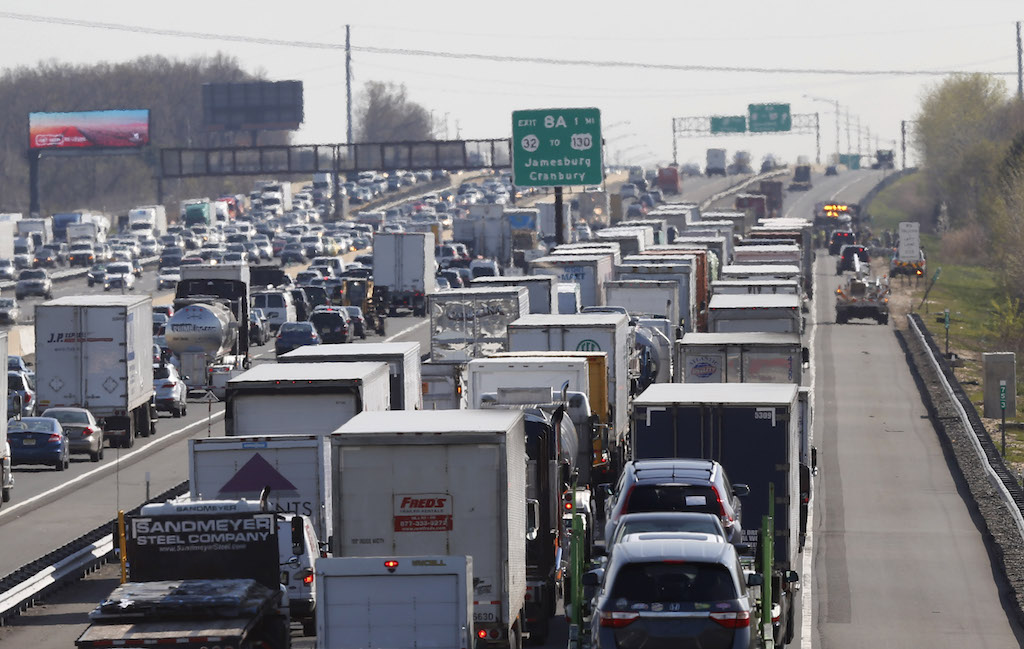a runaway American dream
When one thinks about New Jersey today—and as I live there one is forced to occasionally—it becomes quickly apparent that it clings to its endearment as the “Garden” State rather than necessarily exemplifying it. Industrial towns abound, especially in the heartland, and one such place is Freehold, the birthplace of Bruce Springsteen, and where Oscar Wilde once lectured.
I set off on the trail of the Oscar of my American dreams.
Sneeringly, neighbors in Pennsylvania regard New Jersey merely as a place one must pass though in order to get to the shore. Admittedly it’s smaller than Pennsylvania, New Jersey being the fourth-smallest of the United States and yet the 11th-most populous, making it the most densely populated.
The spine of all this suburban sprawl is that asphalt accolade to the automobile: the New Jersey Turnpike, one of the busiest roads in the country.
The freeway’s dominance is such that when one confesses residency here, people requiring a more precise location simply ask, “which exit?”—and such is the hegemony of the motor vehicle that locals fail to see any irony in this rejoinder, a pragmatism that tends to mirror Oscar’s story of the American art patron who sued the railroad company because a statue of the Venus of Milo arrived without its arms, and was then awarded the case with damages.
Take Exit 8 off the turnpike and one soon reaches the township of Freehold. It’s one of those places like Oakland, California about which Gertrude Stein once said memorably: “there is no there there”.
Perhaps it is a conflicted place. Its most famous son, Bruce Springsteen, both loved and the hated Freehold. It left him, he said in his autobiography, “wonderfully and perilously adrift”. Free to memorialize it in a dozen songs of discarded past and rustbelt waste, he eventually slammed the screen door and headed out on the road. Apparently, you’ve gotta get out while you’re young, because the only conflict historians bang on about is the Battle of Monmouth where General Washington and Cornwallis fought out a tied game after overtime, the match being abandoned owing to heat exhaustion.
By now on my Summer pilgrimage the heat was also getting to me, so I decided to concentrate more intently on another Freehold claim to fame, but one that no resident seems to know about. When Oscar returned to New York from the West, he arranged two New Jersey stops on his way to a repeat lecture in Philadelphia. One of these was in the town of Freehold on May 8, 1882.
Biographers had some idea of this, of course, but not the evidence, since online searching wasn’t available back when those chronologies were written. Trouble is, it still isn’t available for a place like Freehold. So this meant a Summer car journey to local archives to discover the details.
I discovered, for instance, that Freehold was even more remote in 1882 than it is today. Special trains had to be laid on to bring the curious from outlying districts and pay their 50 cents to ogle at what the press termed Wilde’s “outre apparel”.
The name of the lecture venue was quite fitting for a man in knee breeches: it turned out to be a place called Shinn’s Hall—named for George W. Shinn, a local businessman—something we didn’t know until now. Later, the hall incongruously became a skating rink and a National Guard armory, but it will not surprise those following my automobile theme to learn that the location is now a parking lot, so there wasn’t much to see.
As I drove around, now even sweatier in stop-and-go traffic, I longed for the blithe untiring steam train and the breezy horse-drawn carriage of 1882.
But pondered my parallel pursuit of Oscar’s America I realized that in this place I would never recapture that sunflower Summer. So having collected newspaper clippings and photographs sufficient for recording Wilde’s visit to Freehold, it was time to leave the old town and return to the hot lanes of the highway.
I was reminded of Paul Simon’s song America and its warning of the futility of searching for a country that does not exist. I used to think the song’s fateful lyrics were figurative. That its allusions were an allegory. But when the six lanes of highway in my direction ground to a halt I learned the irony of the coda. That all who come to look for America really do end up counting the cars on the New Jersey Turnpike.
© John Cooper, 2017.




Great article! I live close to Freehold ( that’s 7A for all you P.A. readers) and appreciated the Oscar Wilde connection to my neck of the woods.
If a tree falls in the woods and no one is around to hear it…
If a rare collection exists and no one is there to experience it – to the likes of a “literary wink in the dark” – should the next generation even care if fell or not?
LikeLiked by 1 person